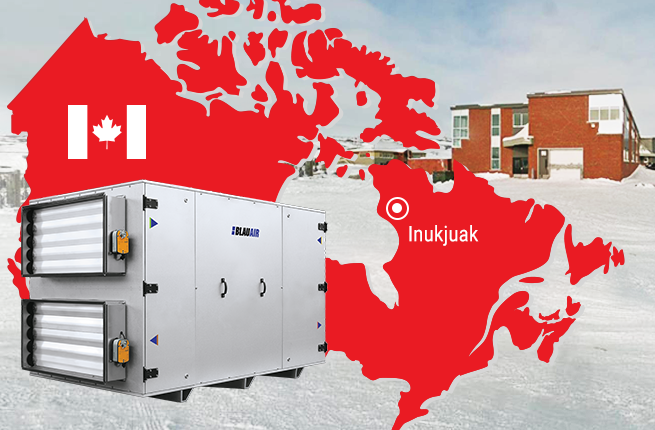
Cold climate conditions when the temperature remains below zero for more than 8 months a year reaching as low as -50 ° in the winter present a host of challenges for ventilation systems.

Cold climate conditions when the temperature remains below zero for more than 8 months a year reaching as low as -50 ° in the winter present a host of challenges for ventilation systems.
Cold climate conditions when the temperature remains below zero for more than 8 months a year reaching as low as -50 ° in the winter present a host of challenges for ventilation systems. Let's take a look at how these challenges can be overcome using the feedback on BlauAIR 07 CFH 6000-W operation, which we received during MCEE 2019 in Canada.
More than two years ago the local council decided to upgrade the ventilation systems of the municipal building in the village of Inukjuak in the north of Quebec, Canada. This area is characterised with a rather cold climate with summer temperature averaging 9-10 °C. The frost already sets in October and may last till May while temperatures may drop to -30 °C or even as low as -50 °.
Considering the conditions engineers use their best efforts to minimise heat losses and reduce heating costs. This goal is commonly achieved by sealing off buildings. However, complete air-tightness prevents natural air exchange, which reduces the quality of air in the treated rooms and the oxygen content and leads to an increase in concentrations of CO2 and other harmful impurities not to mention increased humidity. The breathing environment of such a building adversely affects occupant health and the condition of the building itself.
This is why it is impossible to seal off a building without forced ventilation, which, in turn, would case heat losses in the treated rooms.
Supply and exhaust ventilation systems with heat recovery provide an effective solution for such problems. Such ventilation systems ensure fresh air supply and stale air extraction from the treated rooms while using extract air heat to temper the supply air stream. The efficiency of this process called "heat recovery" in state-of-the-art ventilation units can reach above 90 %.
Still, it is far from being simple since low air outdoor temperatures may cause heat exchanger core freezing. The contact of warm air with the cold surfaces of a heat exchanger, which are cooled by outdoor air, results in condensation. This water can freeze limiting the warm air flow leaving the system and causing the heat exchanger core to cool even further. Eventually, this may lead to system shutdown.
Therefore, the municipal building required a ventilation unit with extensive capabilities to fill such a tall order.
This is exactly why the client chose BlauAIR 07 CFH 6000-W. This air handling unit has a bypass duct with an automatic actuator. When the automatic control system detects near-freezing conditions, the exhaust fan is automatically disabled while the supply fan continues to deliver warm indoor air to temper the heat exchanger core. As soon as temperature balance is restored, the air handling unit reverts to normal operation. To ensure successful operation in challenging climatic conditions, the BlauAIR unit was fitted with heaters to prevent core freezing and provide additional supply air heating.
And last, but not least, the high efficiency results from reduced power consumption thanks to EC motors.
The air handling unit has been running in Inukjuak for over two years delivering the exact level of performance that the client expected.
For more details about the model range and the BlauAIR characteristics click here.